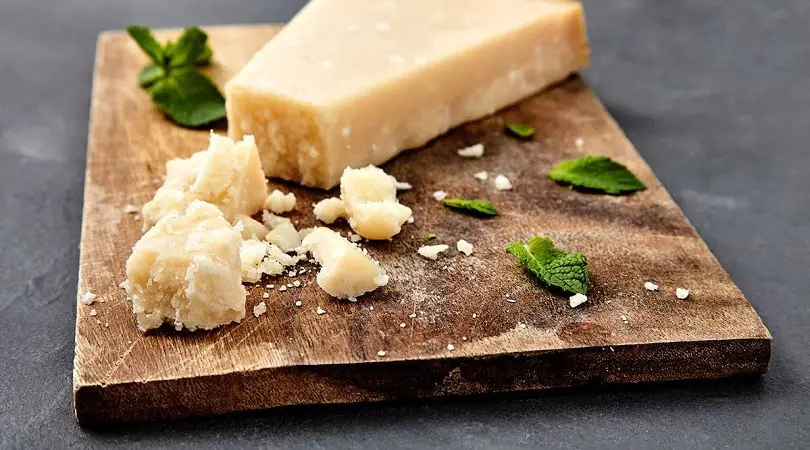Last Updated on January 6, 2025
Yes, you can safely eat parmesan cheese while pregnant. Here’s why.
Parmesan cheese is a popular variety of cheese that is enjoyed by many people around the world. However, when it comes to pregnancy, it is important to be mindful of the types of foods that you consume. This is because certain foods can pose a risk to the health of both the mother and the unborn baby.
Fortunately, parmesan cheese is generally considered safe for pregnant women to eat. Made from pasteurized cow’s milk, parmesan cheese is a hard cheese that is aged for a long period, which helps eliminate harmful bacteria. As a result, the risk of contracting foodborne illnesses, such as listeria, is low. However, it is still recommended to consume parmesan cheese in moderation, as it is a high-fat food. Including it as part of a balanced diet can be a delicious and nutritious addition to your meals during pregnancy.

Related: Can I Eat Peaches While Pregnant?
The Safety Of Parmesan Cheese During Pregnancy
During pregnancy, you may be wondering what foods are safe to consume, and whether or not you can still enjoy some of your favorite dishes. Parmesan cheese is a popular choice for many, with its rich flavor and versatility. But is it safe to eat parmesan cheese while pregnant?
Let’s dive into the safety of parmesan cheese during pregnancy and explore its nutritional value.
Overview Of Parmesan Cheese
- Parmesan cheese is a hard Italian cheese made from cow’s milk.
- It is typically aged for at least 12 months, which gives it a strong and nutty flavor.
- Parmesan cheese is often grated and sprinkled on various dishes such as pasta, salads, and soups.
- It is a staple in many culinary traditions and is loved for its umami taste.
Nutritional Value Of Parmesan Cheese
Parmesan cheese not only adds a burst of flavor to your meals, but it also provides several essential nutrients that are beneficial during pregnancy:
- Calcium: Parmesan cheese is a rich source of calcium, which is essential for the development of your baby’s bones and teeth.
- Protein: Protein is crucial for the growth and repair of tissues in both your and your baby’s body, and parmesan cheese is a good source of it.
- Vitamin A: Parmesan cheese contains vitamin A, which plays a vital role in fetal development, particularly in the formation of the eyes, ears, and limbs.
- Vitamin b12: This vitamin helps maintain healthy nerve function and aids in the formation of red blood cells.
- Zinc: Parmesan cheese is also a source of zinc, which assists in proper immune system function and cell growth.
Importance Of A Healthy Diet During Pregnancy
Maintaining a healthy diet during pregnancy is essential for your overall well-being as well as the healthy development of your baby. Here’s why:
- Nourishment for your baby: The nutrients you consume directly impact your baby’s growth and development.
- Energy boost: A well-balanced diet provides you with the energy needed to support the physical changes your body goes through during pregnancy.
- Reduced pregnancy complications: Eating nutritious foods can reduce the risk of certain pregnancy complications, such as gestational diabetes and preeclampsia.
- Postpartum recovery: A healthy diet helps prepare your body for the demands of labor and aids in postpartum recovery.
Parmesan cheese is generally safe to eat during pregnancy and can be enjoyed as part of a well-rounded diet. Its nutritional value, particularly its calcium content, makes it a valuable addition to your meals. However, as with any food, moderation is key.
If you have any concerns or specific dietary restrictions, it is always best to consult with your healthcare provider for personalized advice. So go ahead and savor the flavor of parmesan cheese while nourishing yourself and your baby!

Potential Risks And Concerns
Listeria Contamination In Cheese
Listeria is a type of bacteria commonly found in soil and water. It can also contaminate certain foods, including cheese. When pregnant, it is important to be aware of the potential risks associated with consuming parmesan cheese, as it is a type of cheese that can be affected by listeria contamination.
Here are the key points to consider:
- Listeria contamination in cheese can pose a serious risk during pregnancy. This bacterium can cross the placenta and affect the fetus, leading to a condition called listeriosis.
- Pregnant women are at a higher risk of developing listeriosis, as their immune system undergoes changes to support the growing baby. Listeriosis can lead to miscarriage, preterm labor, or other severe health complications for both the mother and the baby.
- Soft cheeses like camembert, feta, and brie are usually avoided during pregnancy due to a higher risk of listeria contamination. However, parmesan cheese is considered safe for consumption if proper precautions are taken.
Safety Precautions For Consuming Parmesan Cheese
Even though parmesan cheese is generally safe to eat during pregnancy, it is important to follow certain safety precautions to minimize any potential risks. Here’s what you need to know:
- Always opt for properly stored and refrigerated parmesan cheese from a reliable source.
- Check the expiration date and ensure that the cheese is not past its recommended shelf life.
- Thoroughly wash your hands and any utensils used to handle the cheese before and after consumption.
- If you’re dining out or ordering takeout, make sure the parmesan cheese used in your meals is from a trusted establishment that follows proper food safety practices.
- Heat parmesan cheese to an internal temperature of 165°f (74°c) before consuming it in cooked dishes, such as casseroles or pasta sauces.
- Pay attention to any signs of spoilage, such as an off smell, mold growth, or unusual texture, and discard the cheese if you have any doubts.
Taking these safety precautions will help reduce the risk of listeria contamination and ensure a safe pregnancy diet.
Related: Can I Eat Pho While Pregnant?
Pasteurized Parmesan Cheese Vs. Unpasteurized Parmesan Cheese
When it comes to parmesan cheese, there are two types: pasteurized and unpasteurized. Here’s what you should know about each:
- Pasteurized parmesan cheese undergoes a heat treatment process that kills harmful bacteria, including listeria. It is considered safe to consume during pregnancy.
- Unpasteurized parmesan cheese, also known as raw milk cheese, is made from unpasteurized milk and has not gone through the heat treatment process. It carries a higher risk of bacterial contamination, including listeria.
- During pregnancy, it is generally recommended to choose pasteurized parmesan cheese to minimize the risk of foodborne illnesses, especially listeriosis.
- When purchasing parmesan cheese, look for labels that specify “pasteurized” to ensure the safety of the product.
By being aware of the potential risks of listeria contamination, following safety precautions, and opting for pasteurized parmesan cheese, you can enjoy this delicious cheese while pregnant without compromising your health or the health of your baby. Remember to always consult with your healthcare provider for personalized advice regarding your pregnancy diet.
Benefits And Considerations
Parmesan cheese is a popular ingredient that adds a burst of flavor to various dishes. But what about eating parmesan cheese during pregnancy? Are there any benefits to consuming it? Are there any considerations expectant mothers should be aware of?
In this section, we will explore the calcium and protein content of parmesan cheese, how it can be incorporated into a balanced pregnancy diet, and the importance of moderation and portion control for optimal health.
Calcium And Protein Content In Parmesan Cheese
- Parmesan cheese is a rich source of calcium, with a single ounce providing around 336 milligrams of this essential mineral.
- Calcium is crucial for the development of your baby’s bones and teeth, as well as for maintaining your own bone health during pregnancy.
- Adequate calcium intake can also help prevent conditions like preeclampsia and promote healthy muscle and nerve function.
- Additionally, parmesan cheese is a protein powerhouse, containing about 10 grams of protein per ounce.
- Protein is vital for cell growth and repair, and it plays a key role in the development of your baby’s organs and tissues.
Incorporating Parmesan Cheese In A Balanced Pregnancy Diet
- Adding parmesan cheese to your meals can be a simple and delicious way to enhance their nutritional value.
- Sprinkle some grated parmesan over salads, pasta, or roasted vegetables to give your dishes a savory kick.
- Use parmesan as a flavorful topping for homemade pizzas or incorporate it into omelets and quiches for added protein.
- Be mindful of how much parmesan cheese you consume, as it is also high in saturated fat. Opt for lighter options like low-fat or reduced-fat versions when possible.
- Make sure to include plenty of other calcium-rich foods in your diet such as milk, yogurt, leafy greens, and tofu to meet your nutritional needs.
Moderation And Portion Control For Optimal Health
- While parmesan cheese can provide several nutritional benefits, it’s important to enjoy it in moderation.
- Too much saturated fat from cheese consumption can increase the risk of weight gain and other health issues during pregnancy.
- Aim for a balanced approach by incorporating parmesan cheese into a varied diet rich in fruits, vegetables, whole grains, lean proteins, and healthy fats.
- Monitor your portion sizes and opt for smaller amounts to ensure you’re not exceeding your recommended daily intake of saturated fat.
- Remember, a healthy pregnancy diet is all about balance and making informed choices that nourish both you and your baby.
By understanding the calcium and protein content of parmesan cheese, incorporating it into a balanced pregnancy diet, and practicing moderation and portion control, you can safely enjoy the benefits this flavorful cheese has to offer. So go ahead, sprinkle a little parmesan on your favorite dishes, and savor the deliciousness while supporting your overall health during pregnancy.
Related: Can I Eat Potato Salad While Pregnant?
Frequently Asked Questions
Can I Eat Parmesan Cheese While Pregnant?
Yes, you can enjoy parmesan cheese during pregnancy as long as it is pasteurized and consumed in moderation.
Is Parmesan Cheese Safe For Pregnant Women?
Absolutely! Parmesan cheese is safe for pregnant women as long as it is made from pasteurized milk.
What Are The Benefits Of Eating Parmesan Cheese During Pregnancy?
Eating parmesan cheese during pregnancy provides essential nutrients like calcium, protein, and vitamins that support the development of the baby’s bones and teeth.
Are There Any Risks Associated With Eating Parmesan Cheese While Pregnant?
There are no significant risks associated with consuming parmesan cheese during pregnancy, as long as it is from a reputable source and eaten in moderation.
Conclusion
Pregnant women need to be cautious when consuming parmesan cheese due to the risk of listeria contamination. While parmesan cheese is generally safe to eat during pregnancy if it is made from pasteurized milk, there is still a small possibility of listeria contamination.
To minimize this risk, it is recommended to ensure that the cheese is from a reputable source and has been properly handled and stored. It is also advisable to consume parmesan cheese in moderation to avoid excessive sodium intake. Overall, it is always best to consult with your healthcare provider if you have any concerns or questions about specific foods during pregnancy.
Prioritizing food safety and making informed choices will help ensure a healthy pregnancy journey for both you and your baby.











